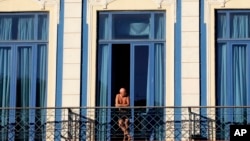The race for Cuba's beach-front is on. Executives from major U.S. hotel chains have stepped up their interest in the Communist island in recent months, holding informal talks with Cuban officials as Washington loosens restrictions on U.S. firms operating there.
Executives from Marriott International, Hilton Worldwide and Carlson Hospitality Group, which runs the Radisson chain, are among those who have held talks with Cuban officials in recent months, they told Reuters.
"We're all very interested." said Ted Middleton, Hilton's senior vice president of development in Latin America. "When legally we're allowed to do so, we all want to be at the start-line ready to go."
The United States and Cuba restored diplomatic relations in July after decades of hostility. Washington chipped away further at the half-century-old
trade embargo this month, allowing certain companies to establish subsidiaries or joint ventures in Cuba as well as open offices, stores and warehouses in Cuba.
The United States wants to strike a deal that lets U.S. airlines schedule Cuba flights as soon as possible, a State Department official said last week, amid speculation that a U.S. ban on its tourists visiting Cuba could be eased.
Restrictions still in place
U.S. hoteliers are not currently allowed to invest in Cuba, and the Caribbean island officially remains off-limits for U.S. tourists unless they meet special criteria such as being Cuban-Americans or join special cultural or educational tours.
Foreign companies have to partner with a Cuban entity to do business and U.S. hoteliers expect they will have to do likewise if and when U.S. restrictions are lifted.
While they wait for the politicians to iron out their differences, U.S. hotel bosses are conducting fact-finding missions in Havana and holding getting-to-know-you meetings with government officials in Cuba and various European cities.
This week, Middleton, along with executives from Carlson and Wyndham Worldwide Corp., which runs the Ramada chain, are meeting with Cuba's Deputy Tourism Minister Luis Miguel Diaz at an industry conference in the Peruvian capital, Lima.
In the 1950s Cuba was an exotic playground for U.S. celebrities such as Frank Sinatra and Ava Gardener, as well as ordinary tourists, who travelled there en masse on cheap flights and ships from Miami.
A recent relaxation of some of the restrictions on U.S. travelers has encouraged over 106,000 Americans to visit Cuba so far this year, more than the
91,254 who arrived in all of 2014, according to data compiled by tourism professor Josе Luіs Perellо of the University of Havana.
Overall, tourist arrivals are up nearly 18 percent this year after a record 3 million visitors in 2014, making Cuba the second-most popular holiday destination in the Caribbean behind the much-smaller Dominican Republic.
U.S. hoteliers expect the number of U.S. visitors to balloon if all travel restrictions are axed.
"If and when the travel ban is lifted. We estimate there will be over 1.5 million U.S. travelers on a yearly basis," said Laurent de Kousemaeker, chief development officer for the Caribbean & Latin American region for Marriott.
De Kousemaeker accompanied other Marriott executives, including chief executive Arne Sorensen, to Havana in July to meet with representatives of management companies and government officials.
Hospitality the buzz word
Even if sanctions were lifted soon, Cuba traditionally has been slow to approve foreign investment projects, making it unlikely that U.S. hotels would be popping up immediately.
Rivals from Canada and Europe have seized the opportunity, operating and investing in Cuban hotels and resorts, alongside Cuban government partners, foryears.
Spanish hotel operator Melia Hotels International SA, is aiming to have 15,000 rooms in Cuba by 2018. It currently has 13,000 rooms via 27 joint ventures.
London + Regional Properties Ltd, a U.K. hotel and real estate development firm, agreed a deal this summer for an 18-hole golf course, hotel and condominium project with state tourism enterprise, Palmares SA, which has a 51 percent stake in the project.
But even with government plans to add 4,000 new hotel rooms every year for the next 15, the island is not ready for a significant surge in tourism.
The island's tourism infrastructure went into decline in the decades following the 1959 revolution. Five-star hotel rooms, good restaurants and cheap Internet access are all in short supply.
When and if they get a green light from both governments, executives said U.S. hotel chains will likely offer branding and management partnerships to
Cuban government partners such as Palmares and Tourism Group Gaviota, the largest Cuban government tourism entity.
The ultimate goal would be to secure long-term leases on resort developments, which is how Cuban authorities have generally operated with foreign hotels.
But right now, U.S. hoteliers can't even refer to tourism when they meet Cuban counterparts, let alone talk about actual deals. Instead the buzz word is "hospitality."
Marriott's de Kousemaeker likes to use an analogy from baseball, a sport loved both in Cuba and in the United States, to describe the situation.
"We're learning, and taking batting practice, but we're sitting on the bench."








